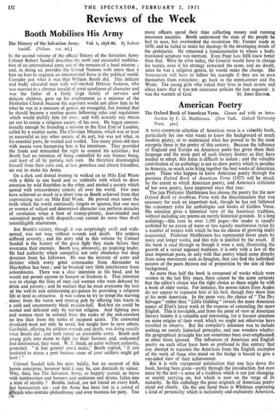Reviews of the Week
Booth Mobilises His Army
IN the second volume of the official history of the Salvation Army Colonel Robert Sandall describes the swift and successful mobilisa- tion of an international army out of the remains of a local mission ; and, in doing so, provides the United Nations with more than a hint on how to organise an international force in the political world. Consider just what it was that William Booth did. This delicate and badly educated man with well-marked Hebraic features, who was married to a chronic invalid of great saintliness of character and was the father of a fairly large family of nervous and delicate children, gave up his employment as a minister of the Methodist Church because his superiors would not allow him to be what he was in a measure of genius, an evangelist, but insisted that he should become a routine pastor following rules and regulations which would stultify him for ever ; and with scarcely any means set out to create a religious society of his own. He began conven- tionally enough by founding a mission in the East End of London, called by a routine name, The Christian Mission, which was at least as successful as any other society of its sort, but was not what, in his essential parts, he wanted and needed. Too many pious old men with means were hampering him in his intentions. They provided the funds and demanded the right to control his activities ; but Booth had no intention of being controlled by any human being, and least of all by pietistic rich men. He therefore disentangled himself from their coils and, at last, penniless and almost friendless, set out to make his Army.
On a dark and dismal evening he walked on to Mile End Waste with a Bible in one hand and an umbrella with which to draw attention by wild flourishes in the other, and started a society which spread with extraordinary celerity all over the world. Few men have achieved so much in a short time as Booth achieved from that unpromising start on Mile End Waste. He proved once more the truth which the world continually forgets or ignores, that one man or woman of valiant and determined character can perform miracles of revolution when a host of niminy-piminy, neat-minded and uninspired people with despatch-cases cannot do more than draft unintelligible resolutions.
But Booth's victory, though it was surprisingly swift and wide- spread, was not won without wounds and death. His soldiers suffered severely ; and the story told in this volume by Colonel Sandall is the history of the great fight they made before they overcame their enemies. Booth was, obviously, an inspiring leader. He had authority which compelled not only obedience but deep devotion from his followers. He was the mixture of actor and dictator which every great commander from Alexander to MacArthur has been ; and he brooked very little interference from subordinates. There was a clear intention in his head, and he would not permit anyone to hamper or frustrate it. That intention was to change the lives of men and women who were debased by drink and poverty ; and he realised that he must overcome the lure of the well-lit and exhilarating gin-palace by providing a religious life at least as attractive. It was useless to try to tempt the starving sinner from the warm and rousing pub by offering him tracts in a cold and uncommonly bleak mission-hall. Red-hot sin could be routed and defeated only by red-hot religion. And fighting men and women must be enlisted from the ranks of the pub-crawlers no less than from the ranks of incipient saints. The converted drunkard must not only be saved, but taught how to save others. Garibaldi, offering his soldiers wounds and death, was doing exactly what Booth did ; and both raised an irresistible army. Booth sent young girls into slums to fight for their Saviour, and, undaunted and determined, they went. W. T. Stead, an actor without authority, protested. " A fine general you'd make," Booth replied, " if you hesitated to storm a post because some of your soldiers might get hurt ! "
Colonel Sandall tells his story baldly, but no account of this heroic enterprise, however bald it may be, can diminish its valour. Why, then, has The Salvation Army, so happily named, so brave with tambourines and banners and uniforms and drums, fallen into a state of sterility ? Booths, indeed, are not found on every bush, but bureaucrats are ; and the Army has been lost in a crowd of pgcials who mistake philanthropy and even business for piety. Too many officers spend their time collecting money and running insurance societies. Booth understood the state of the people he had to save, but overlooked the revolution Mr. Forster made in 1870, and he failed to make his theology fit the developing minds of the proletariat. He remained a fundamentalist to whom a badly translated scripture was inerrant. Even Pope Leo XIII knew better than that. Were he alive today, the General would have to change his tactics, even if his strategy remained the same, and no doubt, since he was a religious genius, he would make the change. His bureaucrats will have to follow his example if they are to save themselves from extinction : go back to the street-corner and the Waste. The young girls who risked their lives in back streets and alleys knew that it was not insurance policies the lost required: it


































 Previous page
Previous page